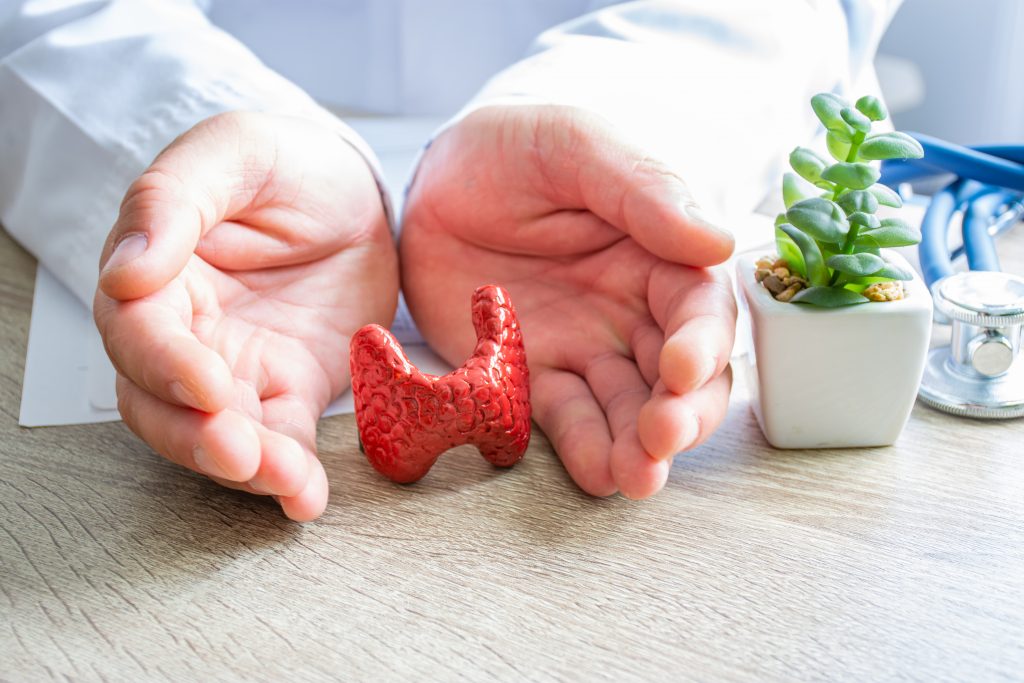Your body is full of glands and organs that produce different hormones and substances to help your body do different things. One gland is known as the thyroid gland and is a small, butterfly-shaped gland located in the front of the neck, wrapping around the trachea. The thyroid is an important gland as it creates and releases hormones that help control your metabolism. The process of metabolism transforms food into energy. The energy is used throughout the body to keep it running and working correctly.
The thyroid controls the T4 and T3 hormones which help tell the body’s cells how much energy to use. As long as your thyroid is working properly, your hormones will keep your metabolism at a good rate. Once the hormones are used, the thyroid will create more. This is all monitored by the pituitary gland, located in the center of your skull, under your brain. This gland monitors and controls the thyroid hormones in the bloodstream. When there are high levels of thyroid hormones in the body, the pituitary gland will create its own hormone called thyroid stimulating hormone (TSH). The TSH gets sent back to the thyroid, giving the thyroid the information it needs to get the body back on track.
Thyroid disease keeps your thyroid from making the right hormones. When the thyroid is not working properly, your entire body can feel the effects. When your body creates too many thyroid hormones, it’s called hyperthyroidism. Your body is using energy too quickly resulting in a faster heartbeat and weight loss without trying. When your thyroid creates too few hormones (hypothyroidism), you may feel tired and may gain weight. An estimated 20 million people in the United States have some type of thyroid disorder.

Common Symptoms of Thyroid Disease
There are a variety of symptoms you could experience if you have a thyroid disease. Common symptoms for hyperthyroidism include:
- Anxiety
- Trouble Sleeping
- Weight Loss
- Enlarged Thyroid Gland
- Muscle Weakness
- Irregular Menstrual Periods
- Sensitivity to Heat Temperatures
- Vision Problems
Common symptoms for hypothyroidism include:
- Fatigue
- Weight Gain
- Forgetfulness
- Frequent/Heavy Menstrual Periods
- Dry/Coarse Hair
- Hoarse Voice
- Sensitivity to Cold Temperatures
Thyroid disease can be difficult to diagnose because the symptoms are common with other conditions. However, blood tests, physical exams, and imaging tests can be used to determine if there is an issue with your thyroid. As far as treatment, your health provider will want to return your thyroid hormone levels to normal. This can be done in a variety of ways. If you have hyperthyroidism, treatment options include medications, radioactive iodine, beta-blockers, and surgery. If you have hypothyroidism, the main treatment option is medication.
Thyroid Disease vs Parathyroid Disease
Some patients confuse thyroid disease and parathyroid disease. While the thyroid lies in front of the trachea, the parathyroid glands are attached to the side of the thyroid gland. They are both endocrine glands, but the thyroid produces hormones that regulate metabolism and the parathyroid produces hormones that control the calcium ion levels in the blood.
Contact Us
At North Orlando Surgical Group, serving the Lake Mary and Orange City, FL areas, we offer minimally invasive surgical techniques to help patients with their thyroid diseases. Our surgeons have vast experience treating thyroid disease and want to help you get your body back on track. We are committed to providing quality patient care and customer service. Contact us today to schedule an appointment!

